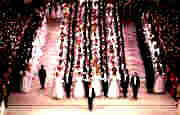
The Vienna State Opera BallHistory of the Vienna Opera Ball
When, in 1854, the young Emperor Franz Joseph decreed that Vienna,
the seat of his court, would be newly laid out, he added:
In 1869 the new opera house on the Ringstrasse was inaugurated. However, four some years passed before Franz von Jauner, then director of the opera house, staged a sensational first opera ball. In Paris it was already a tradition and one of the major attractions in the French carnival season to celebrate opera balls. And simultaneously to the celebration of the first opera ball in Vienna Johann Strauss conducted his eternal waltzes in Paris. However, severe excesses occurred again and again at the Paris ball. That is why only "court opera soirees" were permitted in Vienna, the first being staged on December 11, 1877. Among others the Strauss orchestra performed under the direction of Eduard Strauss, Johann's youngest brother, who even composed an "opera ball polka" on the occasion. In the following years a combination of masked opera balls in the style of the Paris balls and "court opera soirees" were performed. The masked balls were called "Opern-Redouten". However, there was an abrupt end to these splendid celebrations which had soon become a national institution. In 1899 the first of two annually celebrated "Redouten" took place as planned on January 30, the other, however, was not authorized any longer for constructional safety reasons. Gustav Mahler, the then director of the opera house, did not agree to provide the financial means for an improvement of the emergency exits as he had no great understanding for such expenses. Only after the end of World War I the opera house's balls were remembered again, and on January 29, 1921 the first "Opernredoute" of the Republic was celebrated. On the grounds of the economic crisis and the dire need of the postwar period a prolongation of the ball was not feasible.
The first "Vienna Opera Ball" Another decade had to pass before in January 1935 the first ball titeled (called)Vienna Opera Ball was celebrated at the opera house on the Ringstrasse and it surpassed anything the house had seen.
Another decade had to pass before in January 1935 the first ball titeled (called)Vienna Opera Ball was celebrated at the opera house on the Ringstrasse and it surpassed anything the house had seen.
"It was most extraordinary, the first sight of the enormous auditorium and stage. It was a shimmering dream of lights, plants and flowers, and there was music everywhere ..." However, there were only three consecutive ball seasons - in 1938 also this era of opera celebrations had an end.
The last time before Second World War the Viennese People danced in
February 1939.
On the 12th of March, 1945, the opera was virtually totally destroyed.
The festive reopening with a gala performance Beethovens "Fidelio"
would not take place until 5th of November, 1955, and on the 9th of February1956, the first postwar
Opera Ball once again captivated international society.
From this day on the international renown of the ball has been on the rise continually.
It is a national event under the patronage of the Austrian Federal President. Strictly following
tradition the evening is always opened by the artists. There has been only one innovation:
 Once in a year's time, - on the Thursday preceding Shrove Sunday to be exact, The Vienna State Opera's playbill is interrupted: Instead of opera arias or the art of ballet a ball is staged.
|
 From the very beginning, the Vienna Opera Ball was an international social event of the first magnitude.
It is the spiritual child of dance evenings held in the Redoutensaal and in Viennaīs aristocratic palaces. Their zenith was reached during the brilliant balls and receptions held during the Congress of Vienna which went down in history with the line "The Congress didnīt sit, it danced."
From the very beginning, the Vienna Opera Ball was an international social event of the first magnitude.
It is the spiritual child of dance evenings held in the Redoutensaal and in Viennaīs aristocratic palaces. Their zenith was reached during the brilliant balls and receptions held during the Congress of Vienna which went down in history with the line "The Congress didnīt sit, it danced."













